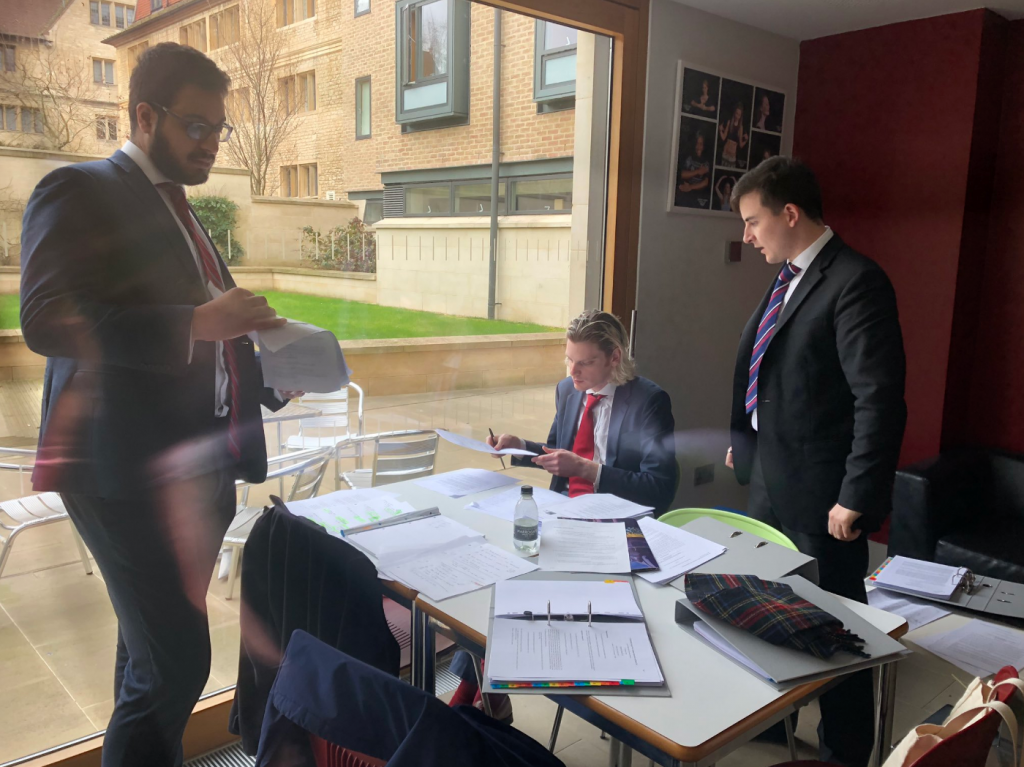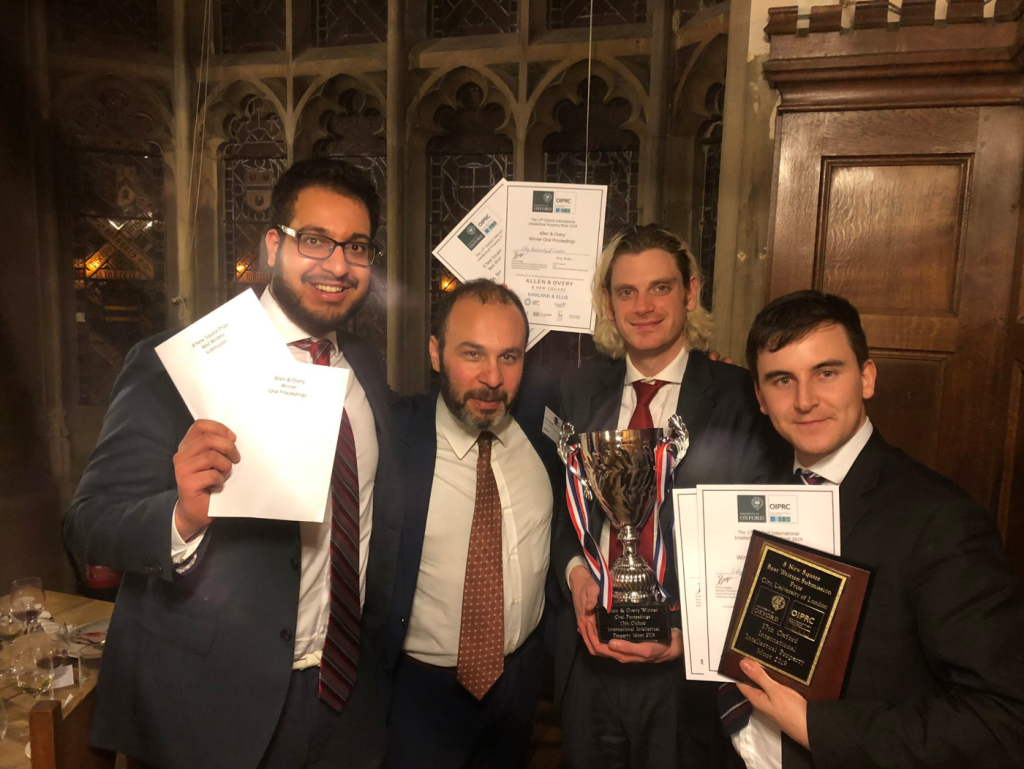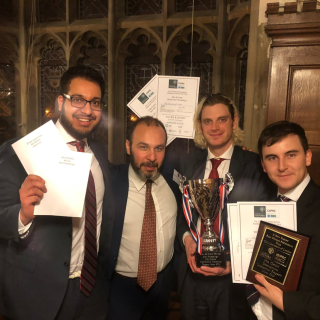In March, a team of three BPTC students from the City Law School, coached by Senior Lecturer Enrico Bonadio, won the Oxford IP Competition: Piers Wingfield Digby, Thomas Mallen and Asfandyar Qureshi. In this piece, Piers tells us about their adventure!
I first tried my hand at the Oxford International IP Moot the previous year (2017-2018) as a GDL student at City, putting in an entry for City’s internal selections with two good friends (Thom and Asfandyar). We were knocked out at the very first hurdle, which taught me the first important lesson of mooting – try, try, and try again!

Looking to get the gang back together, we decided to re-enter for the 2018-2019 Oxford International IP Moot. The problem was an interesting one, with two distinct parts to it. The first was about whether a combination mark of ‘Shangri-Lese’ and English, such as 自己Speed, should be read as “Self Speed” or simply as “Speed” accompanied by an ornamental mark; and whether either of those was distinct enough to be a valid trademark. The second was about the categories of goods protected by trademarks – were skateboards sufficiently similar to racing bicycles that a trademark registered over racing bicycles could be infringed by a nearly identical mark used for a skateboard?
None of our team, aside from our brief attempt last year, had any real exposure to IP Law. This meant a lot of long nights and frantic shots of coffee attempting to decipher various IP Law textbooks. However, what we found was a really interesting area of law that as a student you simply wouldn’t otherwise encounter. This is an incredibly functionalist area of the law – what matters is protecting consumers and promoting working markets, and the law is very much shaped with these practical outcomes in mind. To get a good understanding of when particular principles apply, you have to pick up a good grasp of all the different ways an outcome to a case might affect markets going forward.
To our great surprise, we were selected to represent City at the Moot itself, after an internal competition. The Moot itself was hosted in the Oxford University Law Faculty, and we were given accommodation in Pembroke College Oxford. There were teams present from every continent bar Antarctica. While I’d done a few moots before, they’d simply never been on this scale.

That said, our first round was a domestic affair against the University of Sheffield. It was a scrappy contest – being caught up in preparations for the BPTC exams, we were a little undercooked on the IP law front and faced a steep learning curve. However, we picked up over the course of our next three rounds, trying to adapt in the face of what other teams brought. It was pretty tense, and at the end of the first day (between rounds two and three), we spent a long night trying to catch up on the law and revise our arguments. By the fourth round, against Singapore Management University, we had improved a lot, and were really happy to pull off a close win against a well-prepared team.
All of the other teams were incredibly friendly, and it was really interesting to hear about the experiences of legal students in a wide variety of different systems – particularly the views of the civil law teams like the Federal University of Rio Grande do Sul and Goethe University of Frankfurt. I will definitely be keeping in touch with some of the people I got to meet.
After the four preliminary rounds, the quarter-finalists were then announced – and we’d made it! I was hugely relieved, because we had been a very inconsistent team – I’d been pretty nervous for a few of the rounds and struggled to keep the composure and clarity necessary to do well in my speeches.
But we did feel that where we were doing well was our ability to adapt. The more the competition went on, the less each moot speech felt like a ‘speech’, and the more it felt like a conversation as judges became heavily interventionist. Rather than having a lot of prepared cases, you needed to be able to hold a good argument as to that consequences of a particular decision, and be able to answer increasingly challenging questions from judges as to what would happen to imports and exports for a given ruling. At this level, mooting began to demand an ability to think on your feet really quickly, and we were picking this up well.
After two knock-out rounds, we made the final against the University of Ottowa, represented by Almut MacDonald, Spencer Malthouse, and Jessica Pugliese. They were an extremely good team and it was a fantastic experience to be able to go up against them. The judges were Lord Kitchin, Lord Justice Floyd, and Mr Justice Henry Carr. This made things rather… careful, because one of the key cases in dispute (Roger Maier and Assos of Switzerland SA v ASOS plc [2015] EWCA Civ 220) was one which had been decided by Lord Kitchin during his time as a Court of Appeal judge – and we had to argue against it! Being grilled by Lord Kitchin while I had to very carefully try to persuade him that his judgment, while not exactly wrong, might have been better if it was different was one of the most terrifying experiences of my life.

In a matter of quite enormous personal relief, for the purposes of the moot, the panel accepted this argument, and we were fortunate enough to walk away as winners. One of the prizes was being able to meet some partners at Allen & Overy LLP, the international intellectual property solicitors’ partnership. David Stone and Marc Döring were kind enough to give us some really good career insights, and explain the ins and outs of working in intellectual property law as a career.
Overall, it was one of the best things I have had the opportunity to do as a student, and I would firmly encourage anyone looking at it to give it a go, regardless of their prior experience of IP law or mooting (which was fairly minimal for all of our team). You might end up doing better than you expect!

